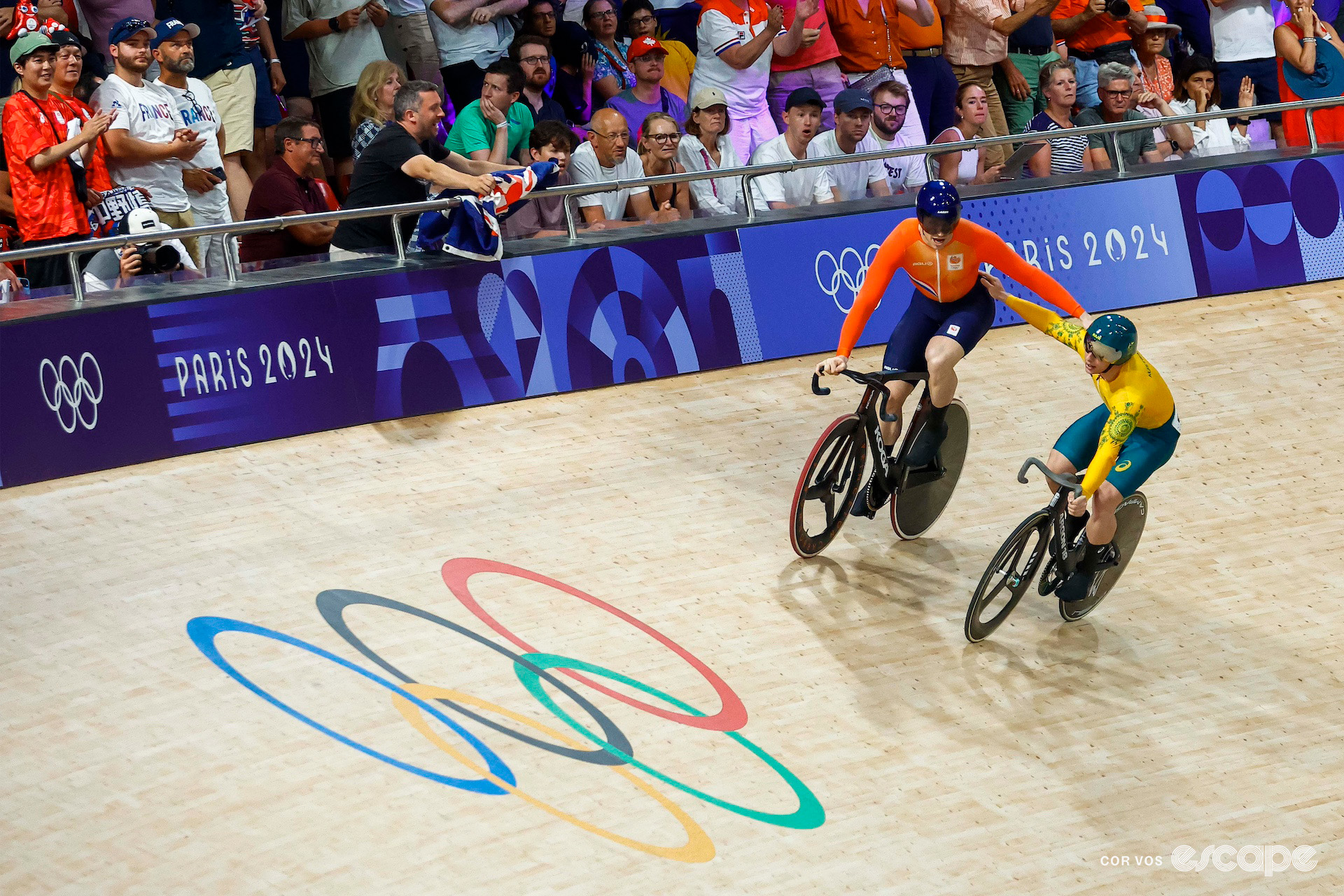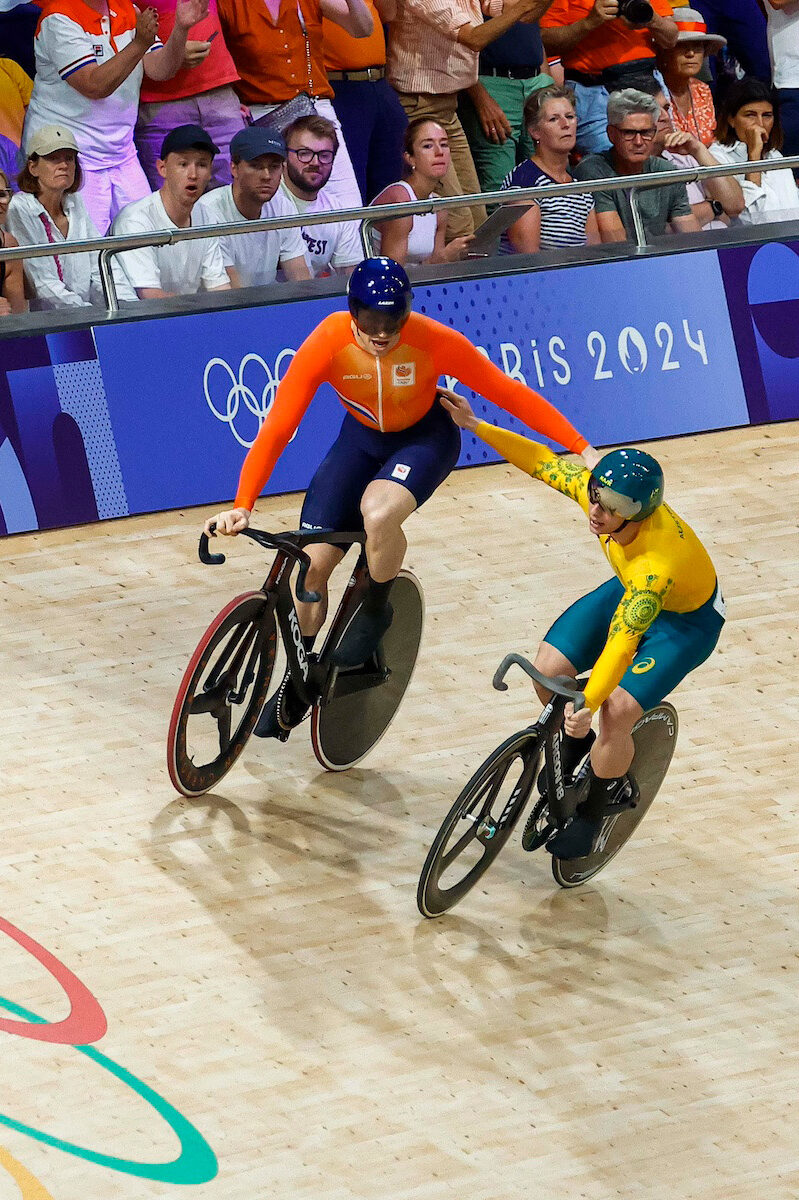Always jam-packed with action, the track cycling at the Olympic Games is always a big draw, and it was no different in Paris. As with all competitions of this kind, there was a fair quantity of expectation coming into the Games, not least for world-beater Harrie Lavreysen, but with track cycling uniquely placed – among the cycling disciplines – as a core Olympic event, there’s always hope for underdogs ,relatively at least, to make a name for themselves, even if they are from a dominant nation.
The Vélodrome National de Saint-Quentin-en-Yvelines was the home of track cycling at the 2024 Paris Olympics, two years after hosting the track World Championships. Since then, the track itself has undergone an overhaul – there were some complaints in 2022 – resulting in a super-fast stage for the biggest sporting event on the planet.
It’s impossible to cover all seven days in all their glory, the joy, the disappointment, upsets, medals and new records – lots of new records – but here are the highlights.
Buckle in, it was a busy week.
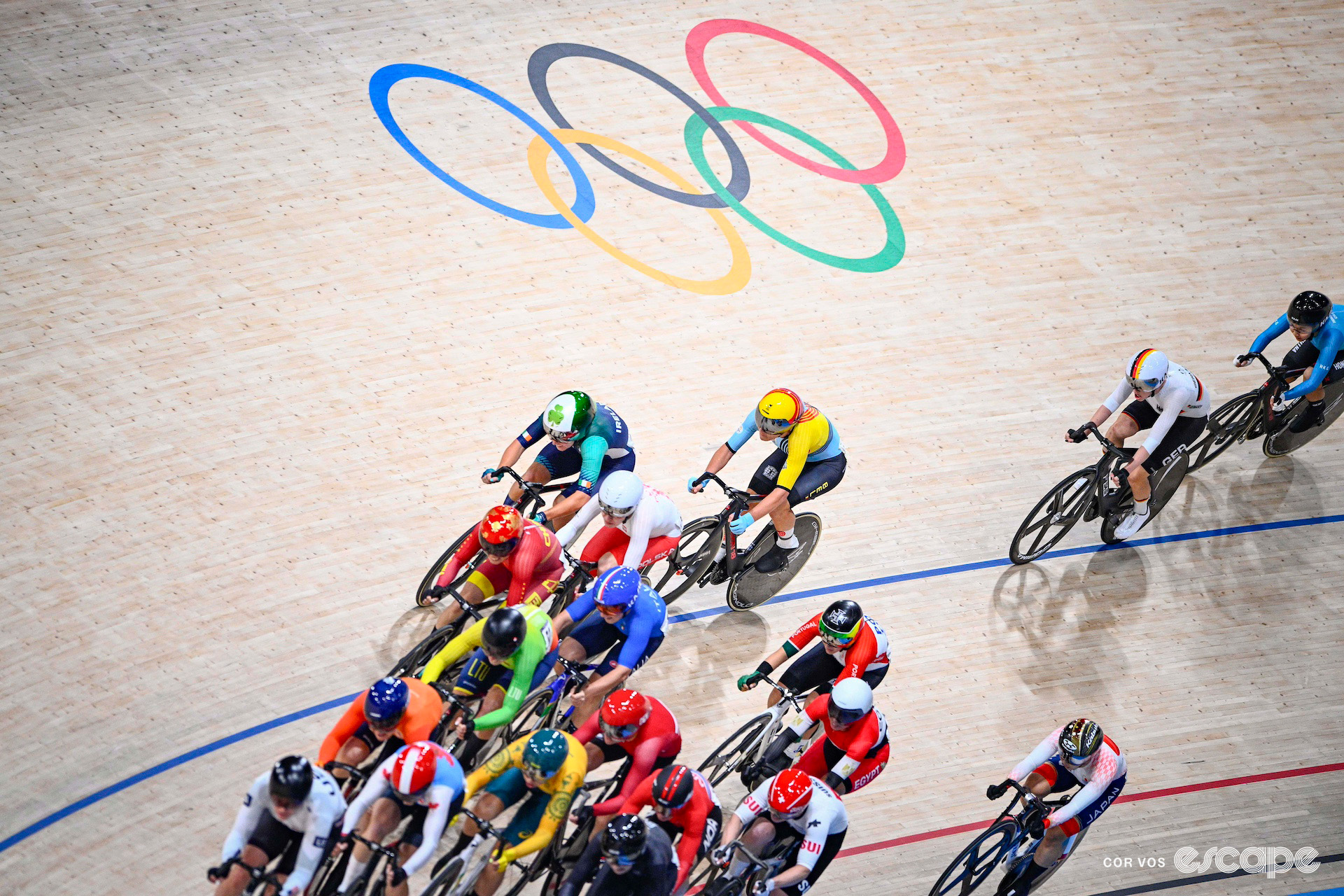
Records tumble as sprinters christen the boards
The first night of track racing truly set the tone for the week with rapid team pursuit qualifiers and the first medals going to the women’s team sprint. From day one, standing world and Olympic records were under threat for a number of reasons: put simply, the winning formula for speed is a hot (really hot) velodrome, a well-designed track with “a constant radius of 23 meters with 43-degree banking in the corners … and exceptionally smooth transitions between the straightaways and turns”, which create a slingshot effect, not to mention damn good form at the biggest competition on the calendar.
The world record for women’s team sprint was broken five times in just a matter of hours on Monday night, Great Britain setting the first benchmark in their first round. Reigning champions Germany and New Zealand cracked through it again when their chance came, but the British trio broke back shortly after, setting up a gold medal final with New Zealand where the world record was broken for a fifth time as Katy Marchant, Emma Finucane and Sophie Capewell roared to victory, becoming the first British women’s team to so much as podium in the team sprint event since its first inclusion in 2012.
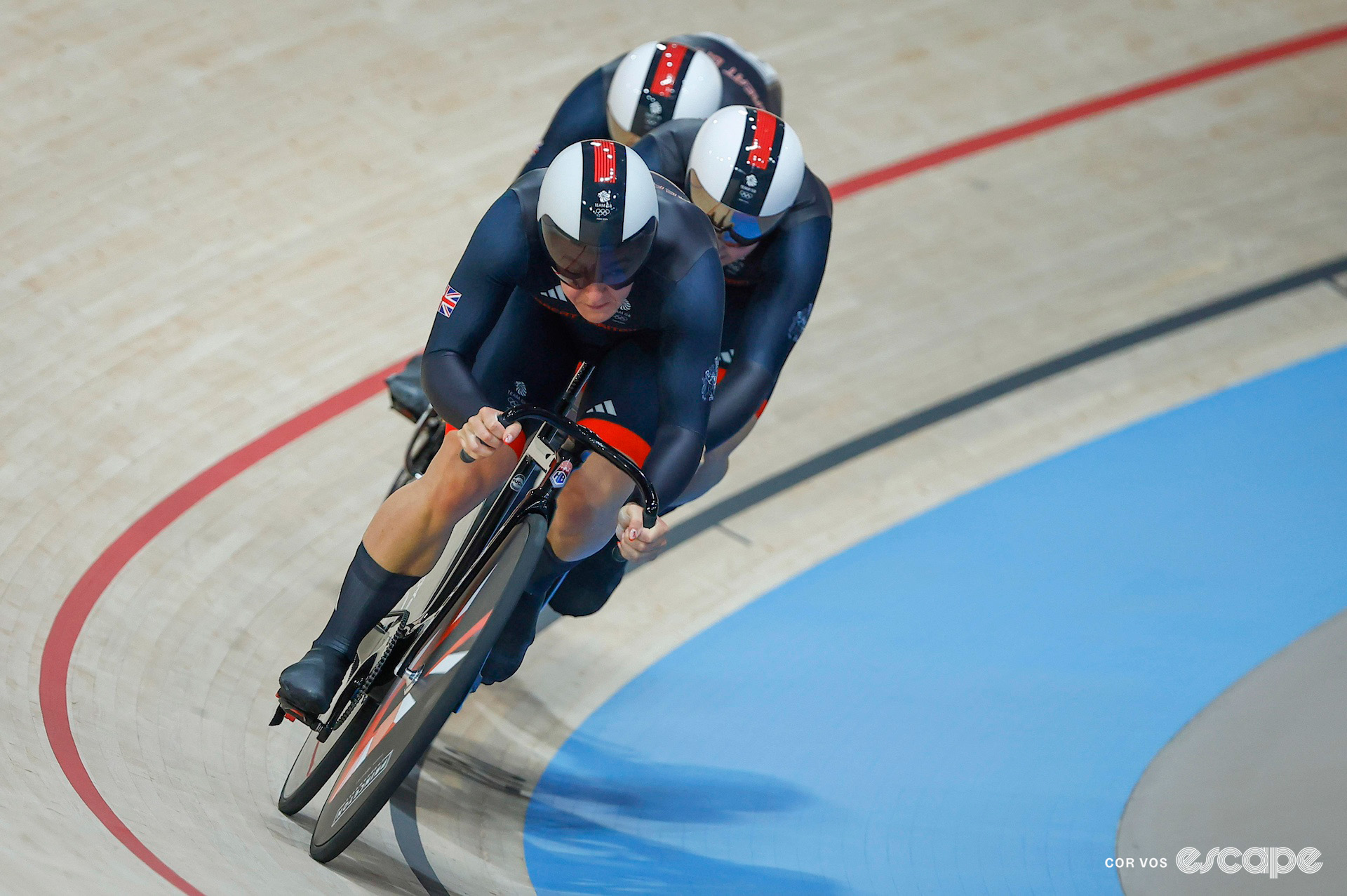
Women’s team sprint podium
- Katy Marchant, Sophie Capewell and Emma Finucane (Great Britain)
- Rebecca Petch, Shaane Fulton and Ellesse Andrews (New Zealand)
- Pauline Grabosch, Emma Hinze and Lea Sophie Friedrich (Germany)
We nailed that ride. I believed in us that we could do it but to execute it like that … I’ve never celebrated like that in my life.”
Emma Finucane said after the team sprint final.
When the men got their chance to get their competitions underway, the superstar Dutch team broke the Olympic record in qualifying before soaring through the following rounds, dispatching each and every opposition they came up against. The new generation of British men had a lot of expectation on their shoulders in the post-Jason Kenny era (he’s still in their corner as GB sprint coach), but Jack Carlin, Ed Lowe and Hamish Turnbull dealt with the pressure well to make it to the gold final, a medal guaranteed.
The outcome was just as expected months, even years in advance as world champions Harrie Lavreysen, Roy van den Berg and Jeffrey Hoogland put their rivals away in dominant fashion. With Great Britain taking silver, there was not a disappointed man on the podium as, in the bronze-medal match, the Australian men took a first Olympic team sprint medal for their nation in 24 years.
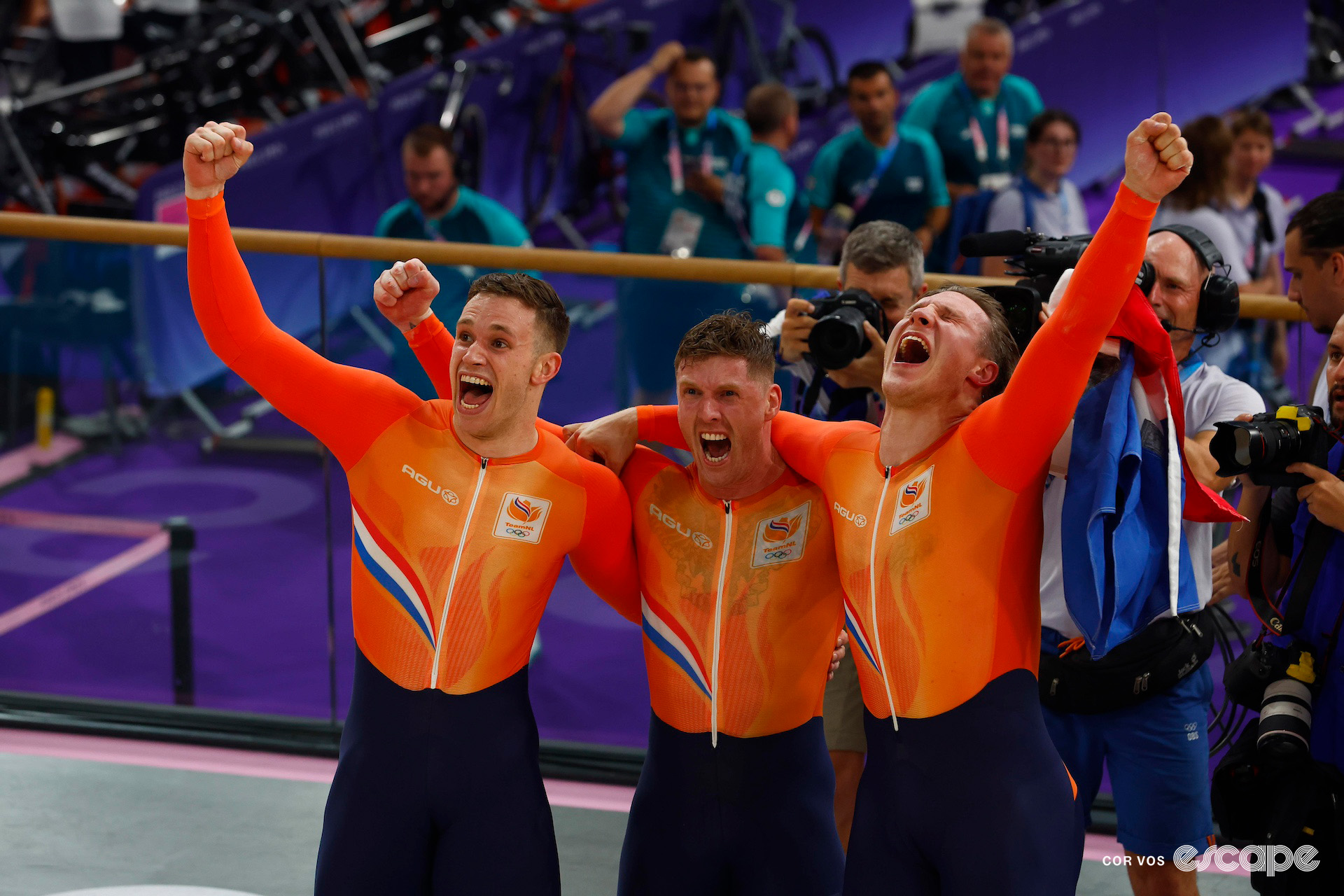
Men’s team sprint podium
- Jeffrey Hoogland, Harrie Lavreysen and Roy van den Berg (Netherlands)
- Jack Carlin, Ed Lowe and Hamish Turnbull (Great Britain)
- Matthew Glaetzer, Leigh Hoffman and Matthew Richardson (Australia)
Consistency and control is rewarded in team pursuits
After qualifying first on day one of competition, the Australian men stayed on top with a world record-breaking ride in the next round to ensure that they would compete for the gold medal, where they met a plucky and dedicated lineup for Great Britain. The top two teams stayed close to create a true spectacle in their final effort, but just as Australia began to look like they were pulling it away, both teams down to three riders (the time taken from the third across the line), Ethan Hayter suffered a unique incident as he slid off the front of his saddle after a split second of contact between his and Charlie Tanfield’s wheels.
Remarkably, Hayter managed to keep it upright, but at such a pace, it was impossible for him to lift himself from the top tube and regain any sort of speed, so Australia flew to the top step of the podium.
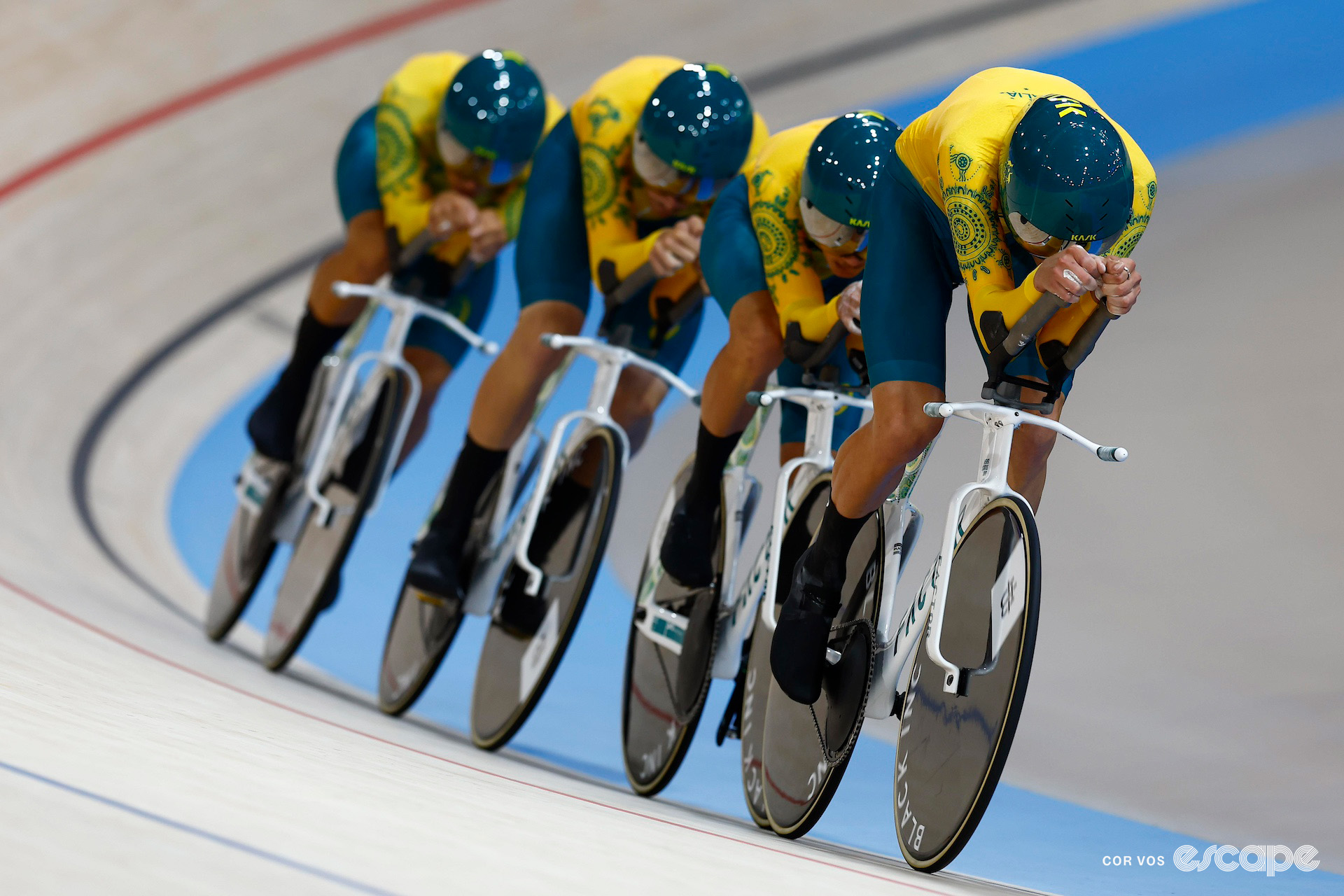
Meanwhile, the bronze medal race saw a rematch of the Tokyo gold final, reigning champions Italy versus Denmark. Being reigning world champions and usually ever-so composed, the Danes looked in control early doors, smooth and steady on the track, but it fell apart for them in the latter half of the effort as rider three dropped and the elastic also snapped between one and two, essentially handing the last remaining medal to Italy.
Men’s team pursuit podium
- Oliver Bleddyn, Conor Leahy, Kelland O’Brien and Sam Welsford (Australia)
- Daniel Bigham, Ethan Hayter, Charlie Tanfield, Ethan Vernon and Oliver Wood (Great Britain)
- Simone Consonni, Filippo Ganna, Francesco Lamon and Jonathan Milan (Italy)
It was close, and I knew in the last three laps they would come quicker, and we just tried to match it. The boys did a good job of keeping their nerve. It is pretty crazy to call ourselves Olympic champions now. We probably did not have these expectations when we started training together. To come together like we did in the last month was pretty special. It has been 20 years since Australia won this, so that will sink in [over] the next week.”
Sam Welsford said after Australian team pursuit victory
In the women’s competition, and picking up where their sprint teammates left off, New Zealand’s team pursuiters were by far the fastest qualifiers, but in their gold match-up with the experienced American team led by Jennifer Valente, the Kiwi women found themselves on the back foot in the first half of the final. Hope re-surged for New Zealand as the Americans briefly lost formation, but then gaps began to open up between the Kiwis too and the United States brought it back together to finally claim team pursuit gold.
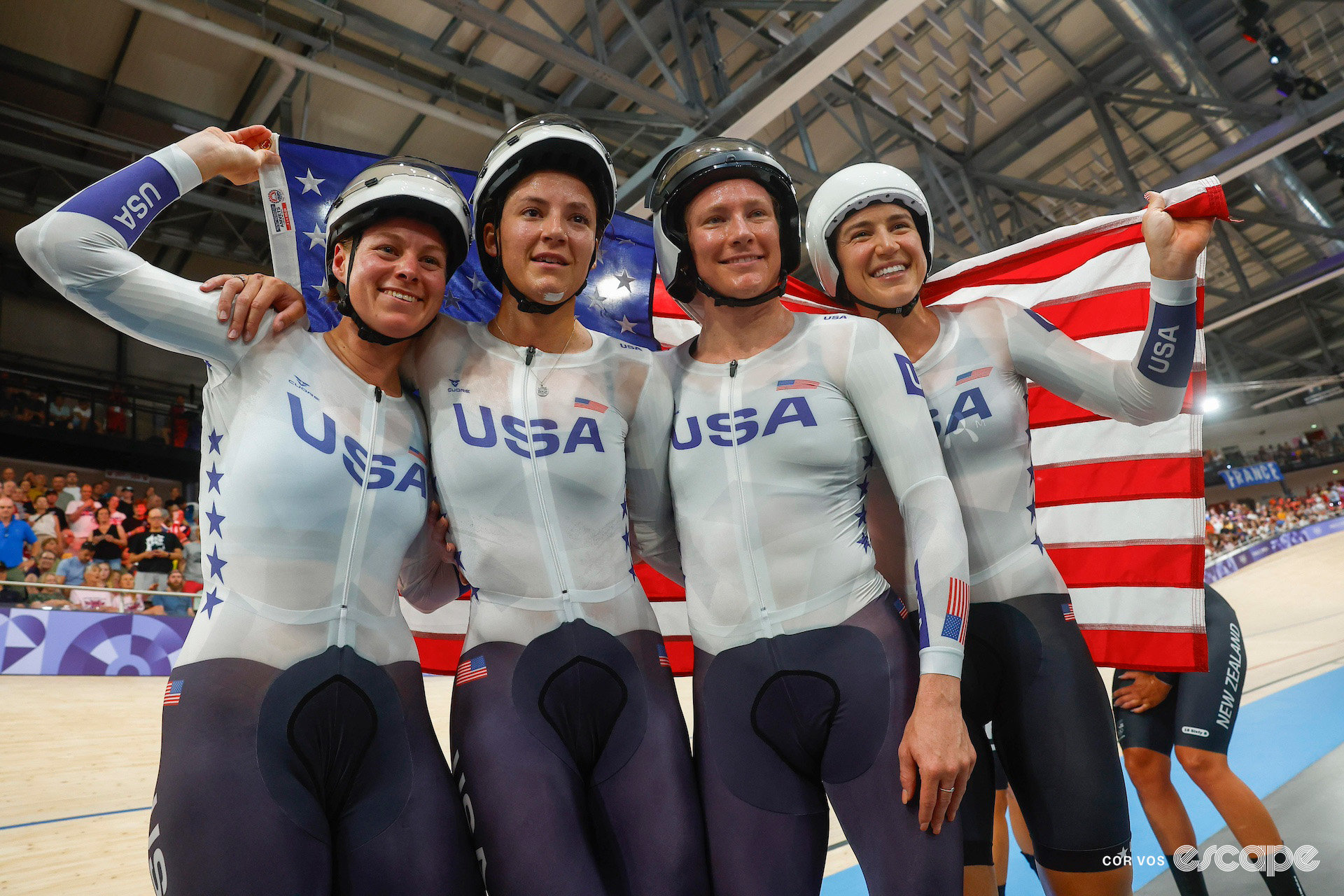
Third place was also hard-fought as the reigning champions Great Britain took on 2022 world champions Italy. The Azzurri led the way from the off, but momentum swung in Team GB’s favour about halfway through, and in the end they snatched bronze by an emphatic margin of almost two whole seconds.
Women’s team pursuit podium
- Chloe Dygert, Kristen Faulkner, Jennifer Valente and Lily Williams (United States)
- Bryony Botha, Emily Shearman, Nicole Shields and Ally Wollaston (New Zealand)
- Elinor Barker, Josie Knight, Anna Morris and Jessica Roberts (Great Britain)
It still doesn’t feel real, to be honest. I think I’ll wake up in a week and it still won’t feel real. Originally my goal was to make the Olympics, then my goal was to take home a medal and to take home the gold is way more than I ever expected or even dreamed of. I think we just got to keep dreaming bigger and bigger things and hopefully there’s more to come.”
Kristen Faulkner said after USA’s team pursuit win, her second gold of the Olympics.
Double champions Andrews and Lavreysen prove unstoppable
There was domination in both individual sprint competitions as Harrie Lavreysen (Netherlands) and Ellesse Andrews (New Zealand) scored victories in both sprint and keirin events – the king and queen of Olympic sprinting.
Reigning (multiple) world champion Lavreysen got his individual sprint defence underway with another world record, this time on his own, as he broke through the ceiling put in place by Nicholas Paul (Trinidad and Tobago) – Paul’s 9.100-second time has stood since the 2019 Pan American Champs, but Lavreysen went 12 hundredths of a second faster to set a new benchmark of 9.088 seconds – in the flying lap that serves as a qualifying round for the sprint heats.
After the intervening rounds, we saw the battle the whole world was hoping for: Harrie Lavreysen vs. Matthew Richardson. The Australian did not take it lying down, but Lavreysen seemed unstoppable all week, never giving away more than a bike length on his way to a second gold of the week.
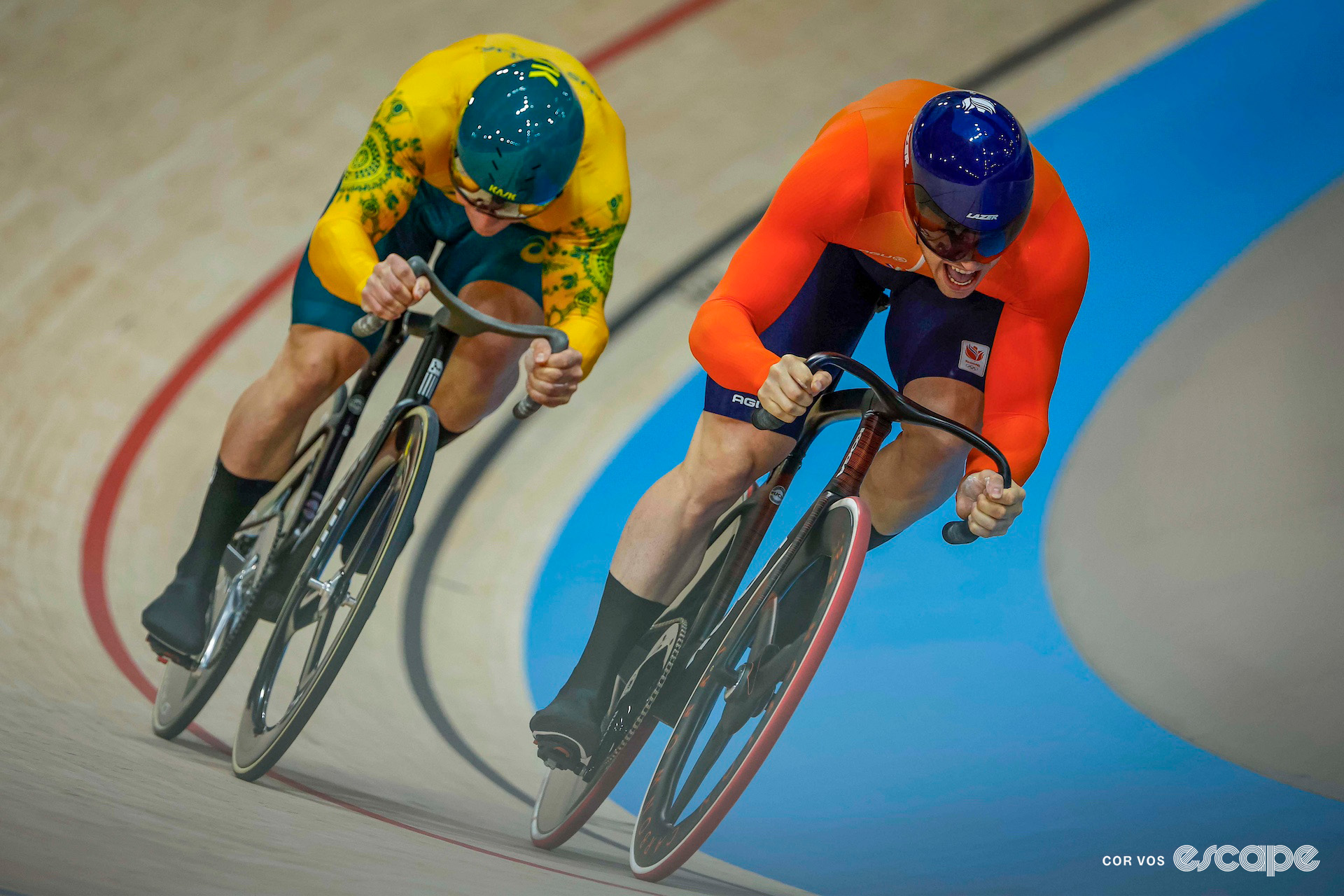
There was drama around the bronze medal match where Jeffrey Hoogland missed out on a medal after a best-of-three battle with Jack Carlin. The Scotsman, already on a yellow card before facing the Dutchman, was accused of “rugby on wheels” by Dutch coach Mehdi Kordi after another jostling move, but the results stood despite further protest.
Men’s sprint podium
- Harrie Lavreysen (Netherlands)
- Matthew Richardson (Australia)
- Jack Carlin (Great Britain)
The depth of the women’s field promised thrilling contests in both sprint and keirin, and that’s exactly what we got, though perhaps not from where and whom we expected – at least maybe not before the Olympics.
Second in the keirin in Tokyo, Ellesse Andrews did not arrive in Paris anonymously be any means, but her utter dominance over the field seemed to mark a changing of the guard, especially with multiple world champion Emma Hinze (Germany) and reigning Olympic sprint champion Kelsey Mitchell (Canada) also in the velodrome.
No Kiwi woman has ever been on the podium for an individual sprint event, but the longer the racing wore on, the more certain it became that Andrews would be the one to achieve the feat, especially after out-sprinting her rivals to take gold in the keirin three days earlier – Hetty van der Wouw (Netherlands) and Emma Finucane (Great Britain) joining her on the podium.
Women’s keirin podium
- Ellesse Andrews (New Zealand)
- Hetty van der Wouw (Netherlands)
- Emma Finucane (Great Britain)
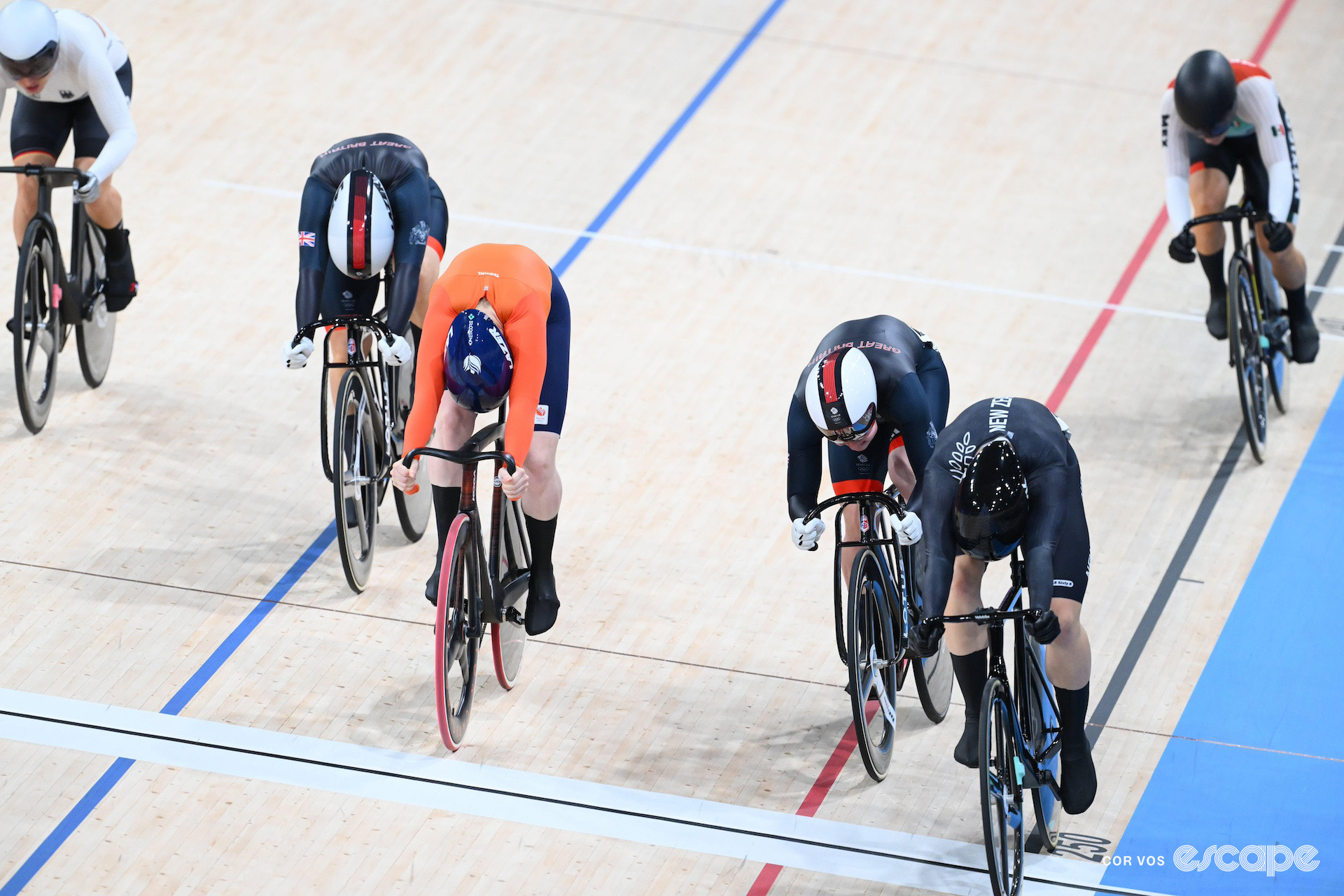
After dispatching reigning sprint world champ Finucane in the semi-final, Andrews faced Lea Sophie Friedrich (Germany) in the final. Friedrich promised to be a formidable opponent for the Kiwi having broken Andrews’s own flying lap world record set in qualifying the day before, but Andrews wouldn’t give an inch. Double gold was hers, and history was made for New Zealand.
Women’s sprint podium
- Ellesse Andrews (New Zealand)
- Lea Sophie Friedrich (Germany)
- Emma Finucane (Great Britain)
On the same day, the final day of competition, Lavreysen went after the only Olympic title that eluded him in Tokyo in the keirin final, and guess what? Despite Richardson putting pressure on him yet again, the Dutchman could not be stopped and he scored his third Olympic gold of the 2024 Games, a clean sweep. His nemesis Richardson was happy to take silver as a nasty crash cleared the way for fellow Australian Matthew Glaetzer to claim the first individual medal of his career at his last Olympic Games.
I’m not often emotional, but this got me … It’s just I think all the tension from a full week and that rubs off me at this moment.”
Lavreysen said after the podium ceremony where he’d been uncharacteristically emotional during the anthem.
Men’s keirin podium
- Harrie Lavreysen (Netherlands)
- Matthew Richardson (Australia)
- Matthew Glaetzer (Australia)
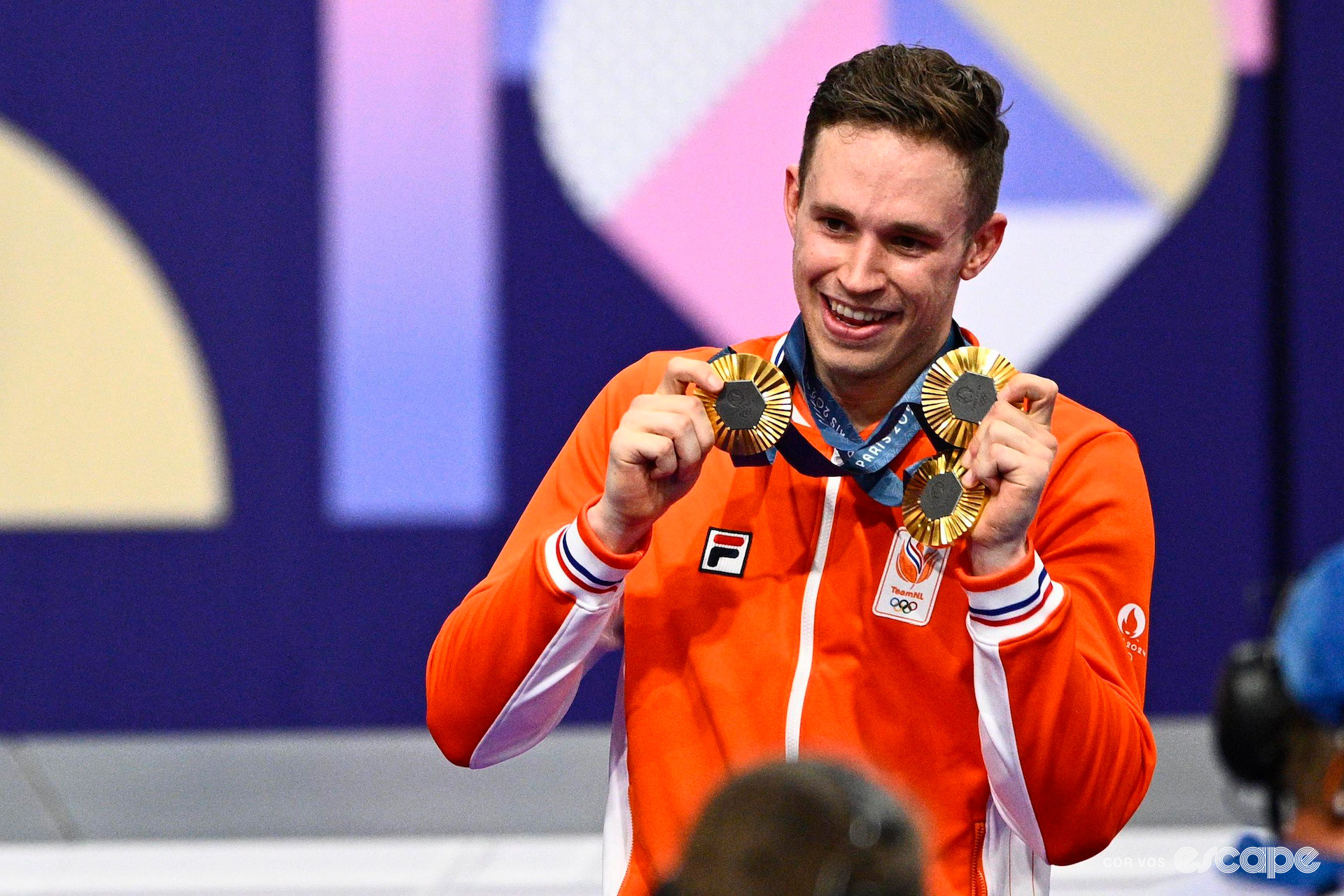
Thrillers of Olympic proportions in the Madison
Always fun, even amusing to watch, both Madisons were thrillers, with crashes also playing their customary part. One of the least predictable track events, they’re often a fairly democratic affair with luck, skill and courage all vital on the crowded track.
In the women’s race, the British pair of Elinor Barker and Neah Evans took an early lead with the French, Italian and Americans pairs nipping at their heels. Ultimately it was lap gains that made the difference as Italy and the Netherlands added 20 points to their tallies, the Dutch only scoring in three of the sprints but holding on for third. Meanwhile, first place in the final sprint confirmed a silver-medal finish for Barker and Evans, as Valente and Williams (USA) were kept from getting any closer to the podium.
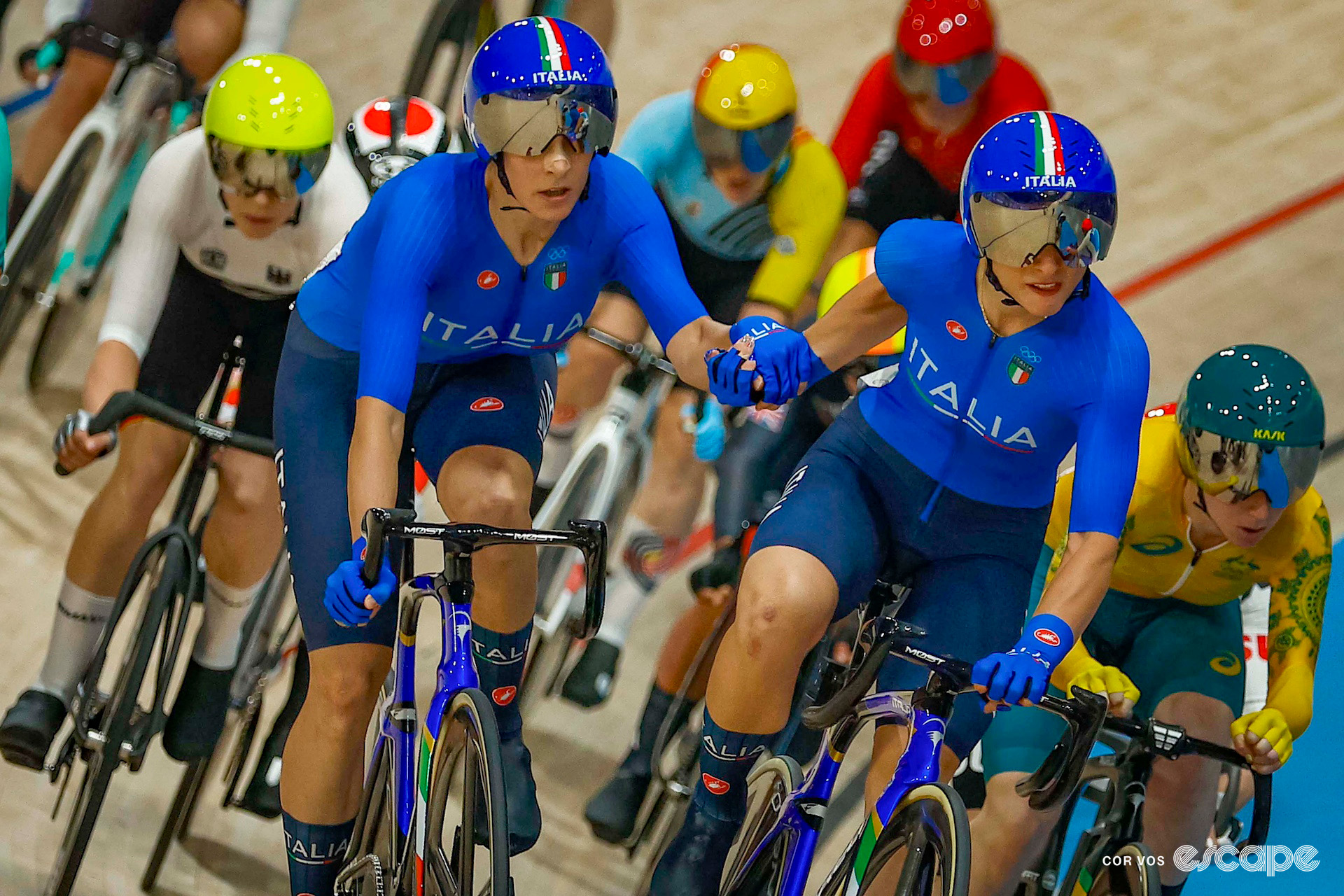
Women’s Madison podium
- Chiara Consonni and Vittoria Guazzini (Italy)
- Elinor Barker and Neah Evans (Great Britain)
- Lisa van Belle and Maike van der Duin (Netherlands)
The men’s Madison was lightning fast. It’s not a timed event, but its 200 laps, or 50 km, were completed in about 50 minutes, meaning an average speed of a whisker over 60 kph. It was exhausting, and the crashes made it particularly attritional and difficult to keep track of. All that meant that the final result brought out elevated emotion for all on the podium and off, everyone feeling they’d been part of a true spectacle.
The super-strong Italian pair of Elia Viviani and Simone Consonni (whose sister won gold in the same event the day before) were flying, as were Spanish pair Albert Torres and Sebastián Mora, and the reigning Olympic champions from Denmark, Michael Mørkøv and new Madison partner Niklas Larsen. However, with crashes continuing to interrupt some of the favourites, Iúri Leitão and Rui Oliveira of Portugal enjoyed a late surge to take a historic win.
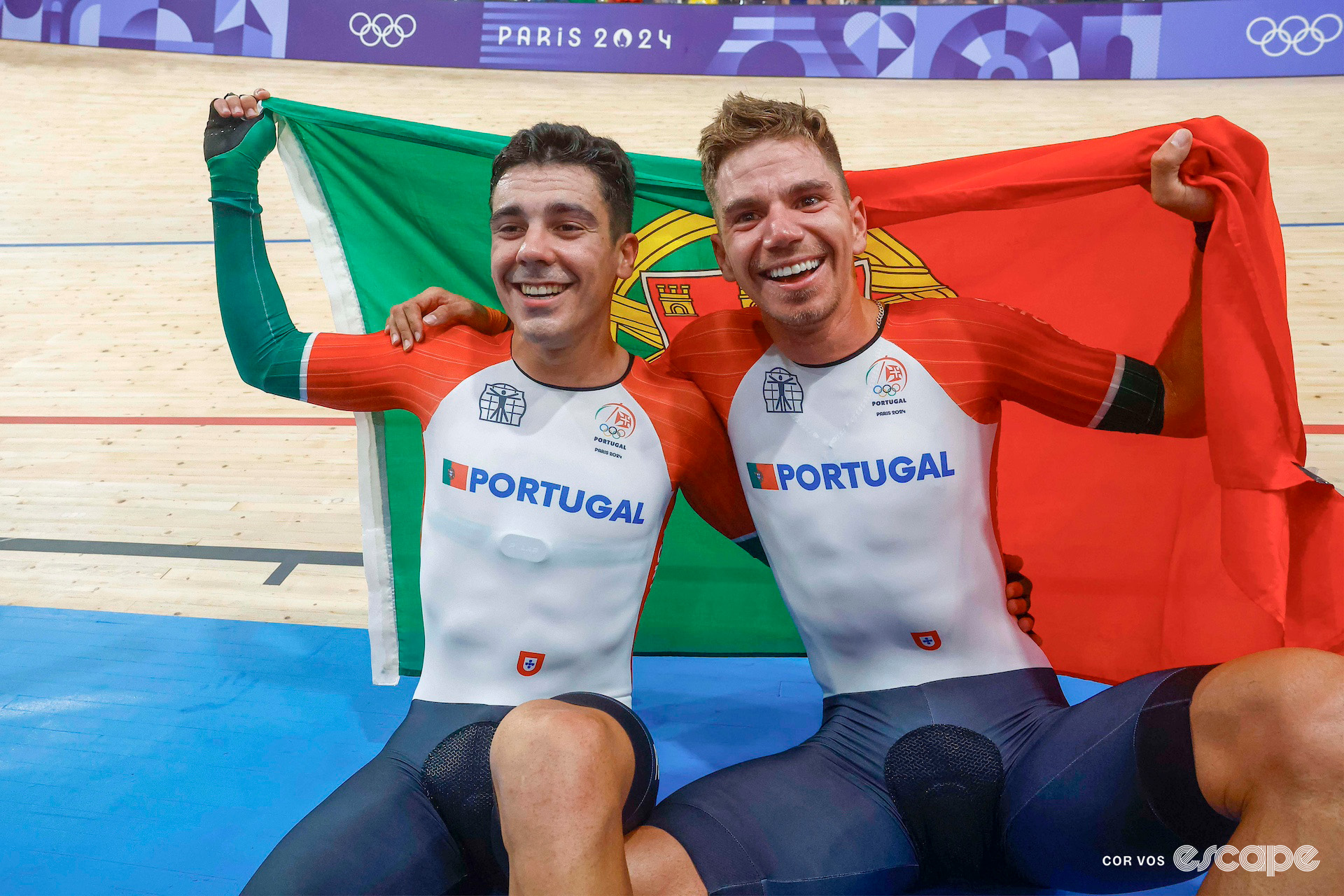
Men’s Madison podium
- Iúri Leitão and Rui Oliveira (Portugal)
- Simone Consonni and Elia Viviani (Italy)
- Niklas Larsen and Michael Mørkøv (Denmark)
Leitão had become the first medalist for his country on the track 48 hours earlier in the omnium, but Madison triumph marked a first olympic gold for Portugal outside track and field, and only the nation’s sixth gold in Olympic history.
I’ve never won a single race in my life. To be Olympic champion as my first win is, well, I still don’t know if this is all real, really. That’s insane.”
Rui Oliveira said through disbelief shortly after Madison victory
All to play for in the Omnium
Finally, we have the omnium, the stage race of track cycling. Again – as always – there were multiple former Olympic and world champions on the start line for the men’s and women’s omnia, with plenty of road racing superstars also in contention.
Ethan Hayter was a major favourite, but despite winning the elimination, the main protagonists came from elsewhere, not least home favourite Benjamin Thomas who won the opening scratch race and finished third in the elimination, even after a curious faux-pas as the officials erroneously called his name, forcing him to chase hard to regain contact. Fabio van den Bossche (Belgium) and Iúri Leitão (Portugal) also enjoyed consistent outings in the early races to set themselves up for a strong start in the points race finale.
A crash-marred points race capped things off at the end of an exhausting omnium, and it was Thomas – fourth in Tokyo – who was able overcome a crash and seal overall victory ahead of history-making Leitão, with 23-year-old Van den Bossche securing bronze.
It’s a cascade of emotions – once I crossed the line and all my friends and family were here. I also went through all these emotions during the race. I couldn’t have dreamed anything better. This is the second time I’m in the Olympics. In Tokyo, I was really disappointed but it’s thanks to this experience that I built on and I looked for the resources that I had to overcome that experience.”
Thomas was delighted to give the home fans something to celebrate.
Men’s omnium podium
- Benjamin Thomas (France)
- Iúri Leitão (Portugal)
- Fabio Van den Bossche (Belgium)
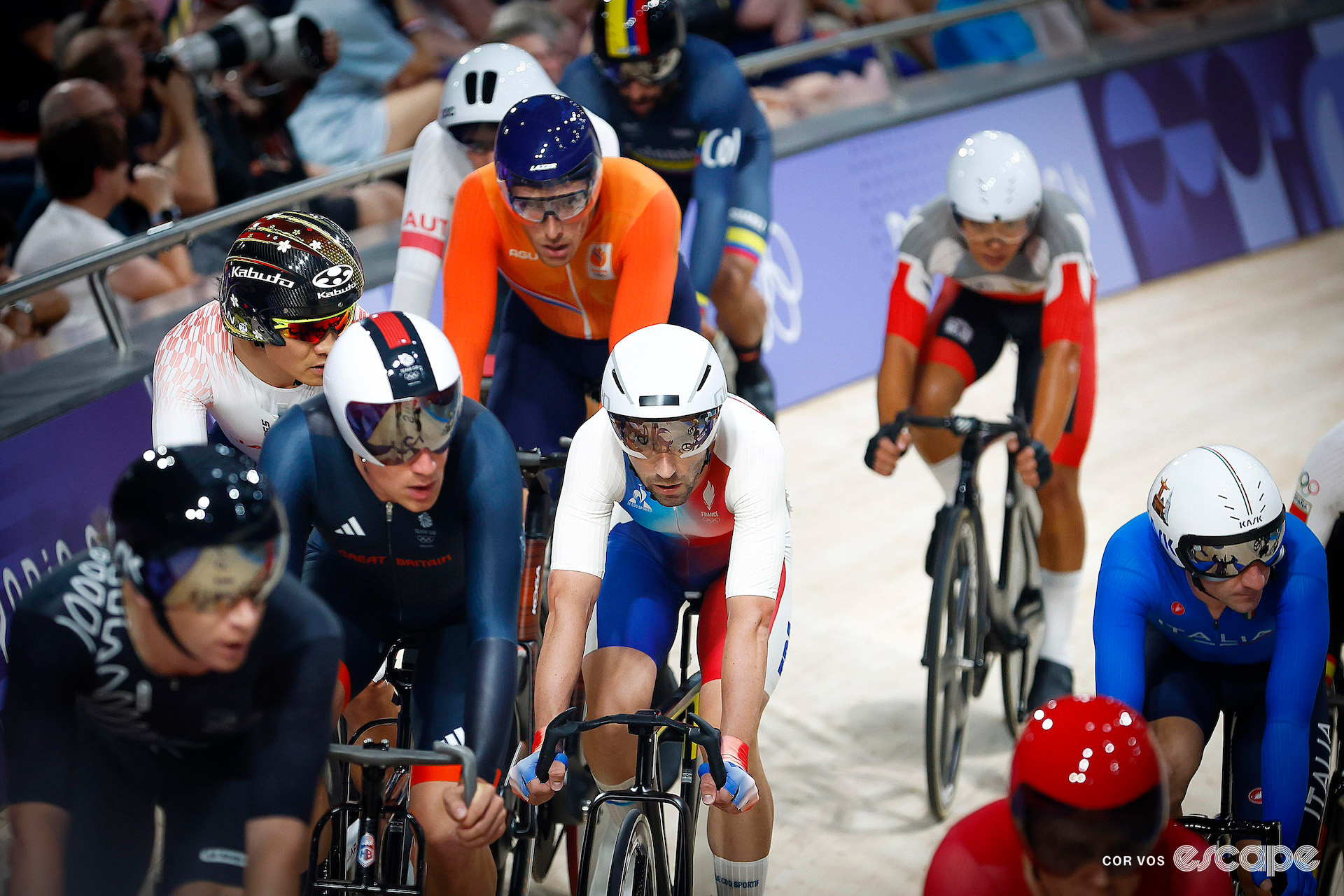
The women’s omnium got off to a cagey start in the scratch race with very few attacks but for French rider Valentine Fortin. Ultimately, reigning Olympic champion Jennifer Valente took first blood ahead of Maggie Coles-Lyster (Canada) and Georgia Baker (Australia), with road world champion Lotte Kopecky surprising everyone with 17th place (out of 22).
Things began to look up for the Belgian favourite in the tempo and elimination races, but no one was as consistent as Valente who seemed very much in charge – keeping herself in prime position without burning too many matches. The reigning champion went into the closing points race with a ten-point lead over Australia’s Georgia Baker, and consolidated her lead in the finale. She was in fact the only one to hold firm on the podium as Daria Pikulik and Ally Wollaston finished strong to take medals for Poland and New Zealand, as Kopecky finished just short in fourth.
Women’s omnium podium
- Jennifer Valente (United States)
- Daria Pikulik (Poland)
- Ally Wollaston (New Zealand)
Did we do a good job with this story?
